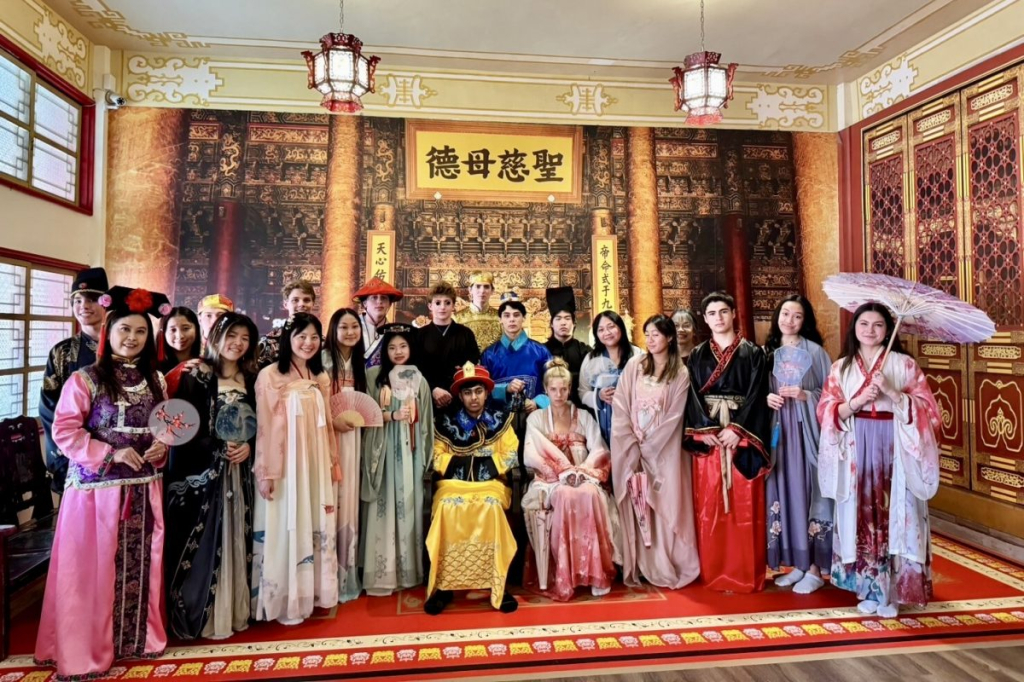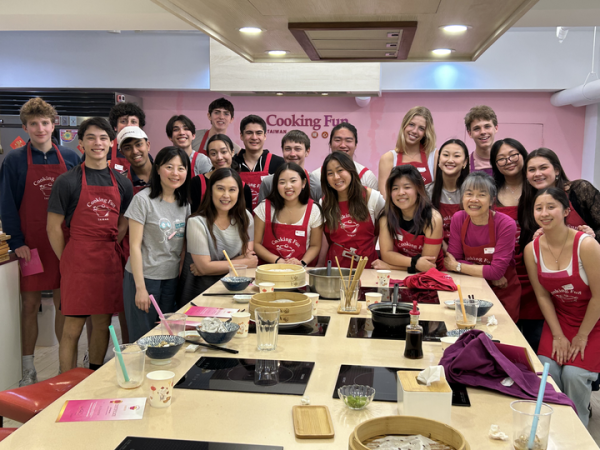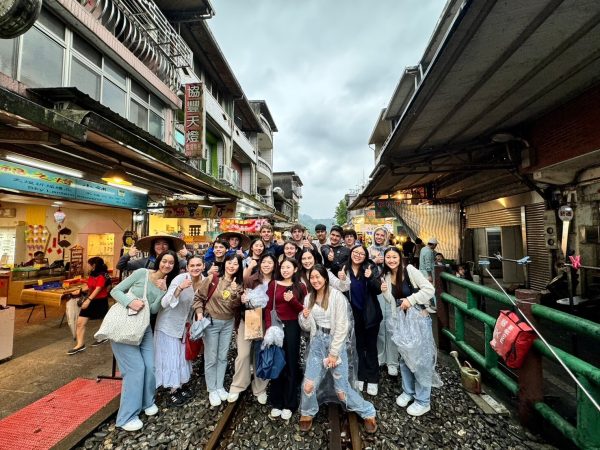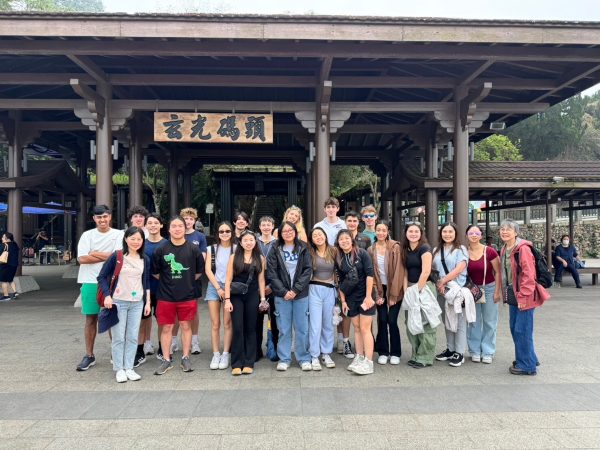【News】Learning beyond the classroom: WHS Mandarin students visit Taiwan

From Thursday, April 4 to Thursday, April 18, nineteen WHS students and three chaperones traveled to Taiwan. “I decided to go on the trip because I thought it would be a once-in-a-lifetime trip, and I love traveling internationally,” senior Sierra Dale said. “I also wanted to practice my Mandarin in a real-world setting.”
(
Wayland Student Press Network / Selena Liu)Twinkling lanterns contrast against the vast darkness of the night sky. The delicious aromas of traditionally cooked Taiwanese food and fresh, handmade desserts waft through the air, drifting with the wind. In one of Taiwan’s infamous night markets, Wayland High School (WHS) students walk through the busy, vibrant streets to explore a unique aspect of the small island’s rich culture.
From Thursday, April 4 to Thursday, April 18, 19 WHS students and three chaperones – WHS Mandarin teacher Yuping Wang, Wayland Middle School (WMS) teacher ChiunFan Chang and former coordinator of Wayland’s China Exchange program Donna Fong – traveled to Taiwan.
“I decided to go on the trip because I thought it would be a once-in-a-lifetime trip, and I love traveling internationally,” senior Sierra Dale said. “I also wanted to practice my Mandarin in a real-world setting.”
The group was originally going to travel along Taiwan’s east coast to visit popular tourist attractions in the city of Hualien. However, on Wednesday, April 3, one day before the group’s arrival in Taiwan, a 7.2 magnitude earthquake hit Hualien. Wang, who had been planning the trip since last October, was forced to abandon her itinerary.
“I found a travel agent and they planned an itinerary for me, which I then presented to the School Committee for approval,” Wang said. “Then, I discussed it with our department head and then our principal. I [met weekly] with a travel agent to revise our plan. Originally, we planned to go to Hualien, [but we] changed our trip from the east to the south. We went to Tainan, and we didn’t go to the east coast.”
Despite the initial struggles the group faced at the beginning of their trip, including the cancellation of their initial flight from Boston to New York City, the rest of the trip went smoothly. For the first 11 days of the trip, the group visited various tourist attractions around Tainan, including temples, museums and amusement parks. They also attended various classes to gain first-hand experience with Taiwan’s culture. Some attractions included the National Palace Museum, the Tainan Salt Fields and the Wen Wu Temple.
“Given we had a tour guide the entire trip, we didn’t speak too much Mandarin,” Dale said. “While we were encouraged to and applied it whenever possible, often the tour guide would jump in and aid in English, or it was easier to revert to English with whomever we were talking to. I would say my listening and fluency when speaking did improve, along with my accent, as it was beneficial to hear the local dialect and emulate the tones and cadences of the language.”
The trip cost each student around $4,800, not including any spare money for souvenirs. While most of each day was spent together as a large group visiting popular tourist attractions, the chaperones also gave students more unstructured free time at night to visit Taiwan’s night markets.
“One of my favorite parts [of the trip] was the night market,” Dale said. “They were teeming with so much life and vibrancy with shops that could fulfill any interest. They stretched across multiple streets and were always glowing under neon lights and packed with people shopping for clothes, eating food at street vendors or hanging out with friends.”
Additionally, Wang believes that the night market provided the best opportunity for students to apply their Mandarin skills and other knowledge they had learned in class.

Courtesy of Yuping Wang
“At the night market, most people don’t know how to speak English,” Wang said. “So when the [students] ordered food or clothes, they had to negotiate. They had to ask, ‘is there any way you can lower the price?’”
The remaining three days were spent doing an exchange with a local Taiwanese high school in the Keelung district of northern Taiwan.
“Those students did not know how to speak any English, so we had to speak Chinese,” senior Ava Balukonis said. “I used a bunch of phrases that I learned from class.”
The group stayed in comfortable three-star hotels and traveled on Taiwan’s streamlined public transportation system.
“One of the biggest differences was the subway system, which was incredibly modern, clean, quiet and efficient, [which made] it incredibly easy to navigate major cities such as Taipei,” Dale said.
Balukonis lived in Hong Kong before she moved to Wayland. As a result, Balukonis went on the trip with some additional background knowledge. She expressed her desire to return to Asia and also noted similarities and differences between Hong Kong and Taiwan.

Courtesy of Yuping Wang
“I just really wanted the opportunity to go back to Asia and do some traveling because I just really haven’t been [traveling] in high school,” Balukonis said. “Obviously, Taiwan is technically a country and Hong Kong is a lot smaller, so it has more of a compact feel. Taiwan reminded me a lot of [Hong Kong] with the landscape, but a lot less people knew English [in Taiwan] because Hong Kong is more international, so [Taiwan] is definitely a lot more rural and local.”
Starting this year, the Taiwan trip will continue to occur every two years after the travel disruptions caused by COVID-19 are no longer present. One of Wang’s most important goals is to share with her students the uniqueness of Taiwan.
“Taiwan is a very small island and it’s very crowded,” Wang said.” Everyone is very connected. It’s not like here, where people live apart. You build more connections with people. Taiwan is a very friendly place. It’s very clean and very green. They have a very good learning environment. Most importantly, [my students] want to come back again.”

Courtesy of Yuping Wang





